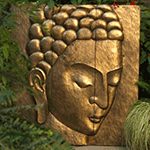The true disciples of Dhamma live with awareness and love,
and are continually inspired
by the manifestation of beauty in their life.
Dhammapada verse 301.
The indescribable beauty of Dhamma
At one time in Japan there was a much loved Zen Master called Baso.
He had many disciples and shared the most wonderful Dhamma with them
However, as kind, generous and loving as he was he was also incredibly ugly. His body was huge (in modern terms we would liken him to Jabba the Hut )with thick lips, long ears and a tongue that could clean his eyebrows.
One day a disciple, a former artist, arrived at his room with a gift.
“Master, to show my love and deepest devotion to you, I have painted your portrait.”
Baso opened the gift and saw his likeness.
His teaching flowed from his heart with these words, “if I really look like this you should kill me. If I don’t look like this you should kill yourself.”
(Zen koan)
This is the true and indescribable nature of Dhamma.
It does not belong to the conventional world and so cannot be understood by the conventional mind with conventional means.
Memorizing and being able to quote the teachings means very little. Living them to the best of your ability is everything!
Dividing the world into what is Dhamma and what is not Dhamma is to misunderstand the training completely, for Dhamma exists in the heart, therefore it is everywhere you are and in everything you see, hear, taste, smell, touch and think.
It is not linear and so the answers to your deepest and most profound intellectual questions will only ultimately lead to more questions, as the mind struggles to understand and place the answer in context to the usual way of thinking.
It is therefore not the Masters place to try to give you any degree of understanding but only to point to the place where you will understand for yourself and by your own direct experience.
True Dhamma understanding cannot be compared to anything in the usual way of thinking and so we have to jump into the realm of ‘not knowing’. Of opening ourselves to the truth of our moment to moment experience of what is called ‘life’.
One of the most important aspects of our Dhamma journey then is the cultivation of the ‘don’t know mind’, for herein lies peace.
‘Not to know’, is the reality of every moment and although we make hundreds of assumptions every day, the truth is that life can change beyond recognition in a single breath, and we can never say with any real certainty exactly what can or will happen.
Naturally, before Awakening, this is an uncomfortable feeling simply because what we really crave in life is certainty, the knowing that if I do this, I will get that. But it’s just an idea, comforting perhaps but never reliable.
So we make our Dhamma determination to no longer be distracted by the minds persistent demand for security and comfort, and for that to happen we need to cultivate awareness, love and a clarity of intention.
To no longer grasp at the mind, but to flow with it, to no longer direct our anger at the world, but to surrender into what we cannot control and respond with wisdom and to no longer fight with others, but to love them beyond our limited perceptions of how they should be.
Even in the best company we are alone and our real home is only this mind with its endless thoughts, moods, feelings and emotions. Our safety arises then, when we are secure in our own personal isolation. When our world is a world of love.
Life itself is formless and to be free in this open, unshaped environment we too must be formless – like pure and chrystal clear water.
May all beings be happy.
*******
Koan:
One day the Master was walking in the snow when he fell down. As he lay there he shouted, “help me up, help me up.”
A disciple heard him and rushed to where he was, and on seeing him immediately lay down beside him.
The Master then stood up and walked away.
Dhamma Quotation:
However much we may argue for them, the obstacles to our complete freedom are desire and fear.
From: The Face of Dhamma by Michael Kewley

